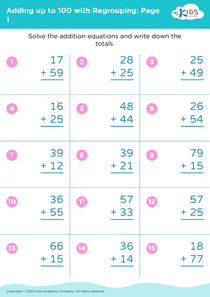Understanding patterns Adding up to 100 Without Regrouping Worksheets for Ages 4-8
3 filtered results
-
From - To
Enhance your child’s mathematical skills with our "Understanding Patterns: Adding up to 100 Without Regrouping Worksheets for Ages 4-8". These thoughtfully designed worksheets help young learners recognize and apply number patterns through engaging exercises. By focusing on addition within 100, kids will solidify their understanding of arithmetic without the need for regrouping. This essential practice builds a strong foundation for future math proficiency. Suitable for children aged 4-8, these worksheets encourage independent learning, critical thinking, and confidence in solving math problems. Download now and watch your child’s skills soar effortlessly in a fun and interactive environment.
Understanding patterns and mastering addition up to 100 without regrouping are foundational skills for young children aged 4-8, and both parents and teachers play essential roles in supporting this learning.
Firstly, pattern recognition is a critical component of early math learning. It helps children understand and predict sequences, which enhances their logical thinking and problem-solving abilities. Patterns also underlie many mathematical concepts, from simple shapes and numbers to more complex algebraic thoughts in later grades.
Secondly, addition up to 100 without regrouping is an important milestone. It builds confidence in basic arithmetic skills, forming the groundwork for more advanced computation later on. Mastery of this skill helps children understand place value, a key concept in math, which is crucial for tasks such as carrying over in addition or borrowing in subtraction.
For teachers, this means structuring classroom activities that build these skills through engaging and varied exercises, ensuring each child catches on. For parents, it involves supportive practices at home, like using educational games, daily life examples (like counting objects or money), and praising efforts to keep children motivated.
Together, these practices help children develop a solid mathematical foundation, contributing to their overall academic success and helping to foster a love for learning that can last a lifetime.


















